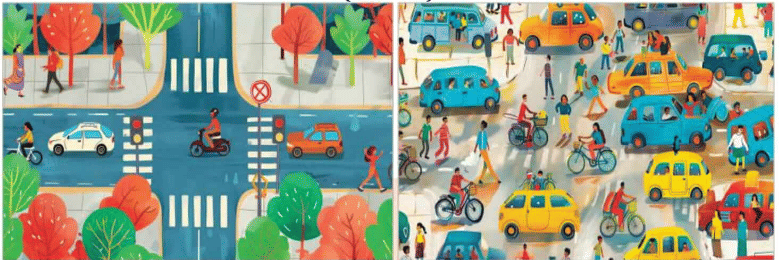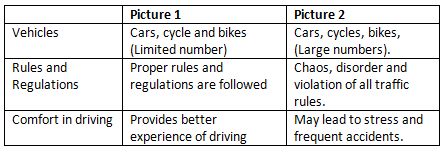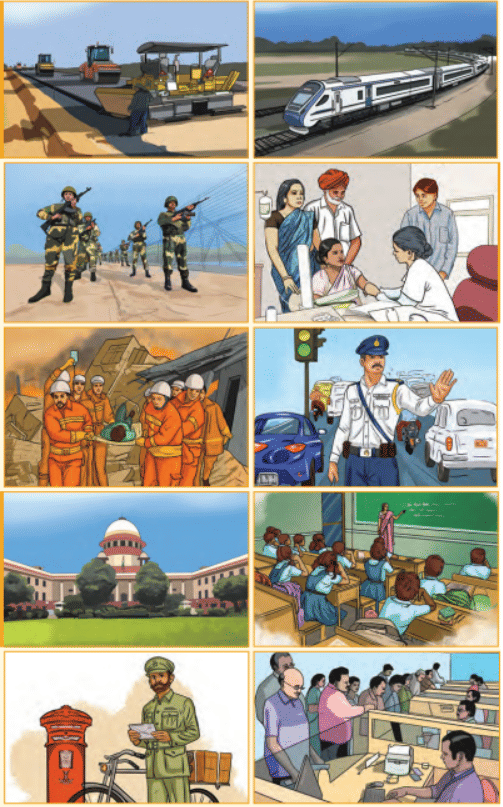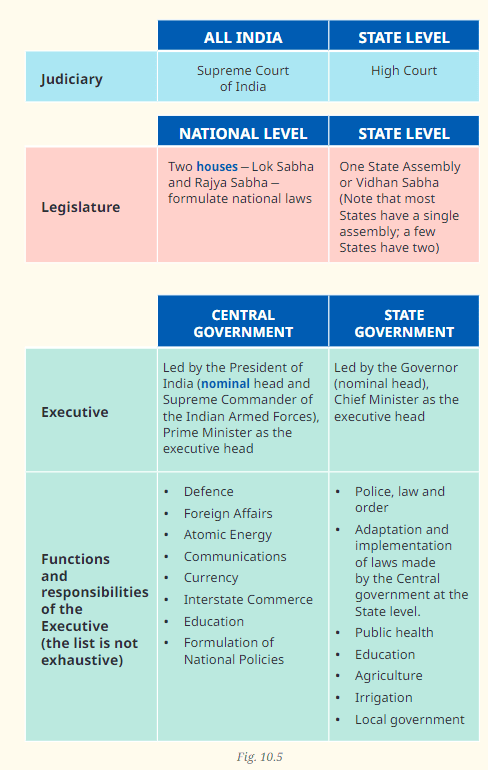Grassroots Democracy — Part 1: Governance NCERT Solutions | Social Studies for Class 6 PDF Download
| Table of contents |

|
| The Big Questions (Page 149) |

|
| Let's Explore (Page 150) |

|
| Let's Explore (Page 153) |

|
| Let's Explore (Page 154) |

|
| Let's Explore (Page 155) |

|
| Questions, Activities and Projects (Page 161) |

|
The Big Questions (Page 149)
Q1: What is the meaning of ‘governance’?
Ans: Governance refers to the process of decision-making and the implementation of these decisions within a system. It involves managing and directing the activities and policies of a group or organisation, such as a country or community.
Q2: Why do we need a government?
Ans: We need a government to maintain order, ensure the safety of citizens, protect rights, and provide public services. A government creates laws, manages resources, and resolves conflicts to promote stability and fairness in society.
Q3: What is the meaning of ‘democracy’? Why is it important?
Ans: Democracy is a system of government where citizens have the power to participate in decision-making, either directly or through elected representatives. It is important because it allows people to have a voice in how they are governed, promotes equality, and ensures accountability of leaders to the public.
Let's Explore (Page 150)
Q1: Describe the two pictures given in Fig. 10.1 on page 151 — what differences do you see between them? Ans: The two pictures likely depict scenarios with and without rules. The first picture may show a chaotic scene where people are not following rules, leading to confusion and disorder. The second picture might illustrate a well-organised setting where rules are followed, resulting in harmony and efficiency.
Ans: The two pictures likely depict scenarios with and without rules. The first picture may show a chaotic scene where people are not following rules, leading to confusion and disorder. The second picture might illustrate a well-organised setting where rules are followed, resulting in harmony and efficiency.
Let us see the differences in Picture 1 and Picture 2:
Q2: How do you connect this with our discussion on rules?
Ans: Rules are essential for social order and a better life. Rules made once can be changed. In school and at home, we also have rules.
Q3: What are some of the rules in your school? Who made them?
Ans: (i) Every school has some rules and regulations for students, teaching staff and non-teaching staff. These are made for safe, better and productive learning environment.
- Attendance: It is mandatory for students to attend school regularly.
- Discipline: Students are expected to follow certain discipline for the orderly functioning of the classes.
- Uniform: Students are expected to wear a neat school uniform and maintain proper hygiene.
- Classroom Behaviour: There are certain conduct of conduct in the classroom for a better learning process.
- No use of electronic devices like mobiles and laptops.
- Bullying, teasing, commenting, and discriminating against others are strictly not allowed.
(ii) The school rules are made by the School Administration, including the Principal and Vice-Principals, along with the suggestions from parents and teachers.
Let's Explore (Page 153)
Q1: Can you identify the categories of public service or other activities that are represented in the ten pictures in Fig. 10.2 on page 152? Ans:
Ans:
- Picture 1: Public development and infrastructure services.
- Picture 2: Transport service.
- Picture 3: Security and safety services.
- Picture 4: Healthcare services
- Picture 5: Disaster management and relief services.
- Picture 6: Road traffic safety (Traffic – Police)
- Picture 7: Judicial services.
- Picture 8: Educational services.
- Picture 9: Postal services.
- Picture 10: Banking services.
Q2: What role do you think the government plays in each of these activities?
Ans:
- Road construction and railway transportation: The government is responsible for building and maintaining infrastructure like roads and railways for public use.
- Border security and military: The government provides national security and defence services to protect the country’s borders and maintain internal security.
- Healthcare services: The government runs public hospitals and healthcare centres, ensuring citizens have access to medical services.
- Disaster management: The government coordinates and deploys rescue teams during natural disasters, providing relief and recovery services.
- Traffic regulation: Traffic police enforce traffic laws and ensure the smooth flow of vehicles, ensuring road safety.
- Judicial system: The government runs the judiciary, upholding laws and ensuring justice through courts.
- Education: The government provides education through public schools, ensuring children have access to learning and growth.
- Postal services: The government runs postal services, facilitating communication and delivery of mail across the country.
- Public administration: Government offices manage various administrative tasks that ensure the functioning of the public sector and other governmental services.
Q3: Can you think of other aspects of your daily life where the government plays an important role?
Ans: There are other areas of our daily life where the government plays an important role, for example:
- Checking and ensuring quality and prices of food articles, milk, etc.
- Helping to preserve forest cover, the environment and reducing pollution.
- Ensuring regular supply of water and electricity.
- Maintenance of parks, cleaning of roads, providing street lamps, etc.
- Providing health and education services.
Let's Explore (Page 154)
Q: Explain how the three government organs are at work in the case of the cyber criminals described above. How do they intervene?
Ans: Here’s how each branch plays its role:
- Legislature: The Legislature makes laws about cybercrime. It writes rules like the Information Technology Act, which say what cybercrimes are and what punishments people get if they break these rules. This helps keep everyone safe from cyber threats..
- Executive: The Executive includes the police and other teams that make sure the cybercrime laws are followed. They catch cybercriminals, collect proof, and stop cyber attacks. They also make plans to keep our computers and networks safe.Judiciary
- Judiciary: The Judiciary is the court system. Judges listen to the evidence about cybercrimes and decide if the person accused is guilty. They give punishments like fines or jail and make sure everyone is treated fairly in court.
Let's Explore (Page 155)
Q: As a class activity, can you imagine the sort of disorder we might witness if all three organs were under the control of the same group of people? Can you describe any such real-life situation you may have heard of?
Ans: If all three organs of the government—Legislature, Executive, and Judiciary—were under the control of the same group of people, we might witness several forms of disorder and abuse of power. Here are some examples of what could happen:
1. Loss of Checks and Balances: Normally, the three branches work independently to keep each other in check, preventing any one branch from becoming too powerful. If one group controls all branches, there would be no checks on their power, leading to potential corruption and misuse of authority.
2. Unfair Laws: The group in power could create laws that benefit only themselves or suppress others. With the Legislature under their control, they could pass unfair laws without public input or debate.
3. Arbitrary Law Enforcement: The Executive, responsible for enforcing laws, could target individuals or groups they don’t like or fear. Without independent oversight, the police and government agencies could act unfairly, discriminating against certain communities or punishing people without valid reasons.
4. No Fair Trials: If the Judiciary is controlled by the same group, there would be no impartial judgment. People accused of crimes might not get a fair trial, and innocent individuals could be imprisoned or punished without proper evidence.
Q1: Observe the table (Fig. 10.5). Highlight the functions and responsibilities that affect your life the most. Ans: The functions and responsibilities from the table that most likely affect your life the most:
Ans: The functions and responsibilities from the table that most likely affect your life the most:
- Police, Law, and Order (State Government): Ensures personal safety and security in your daily life, and maintains peace and order in society.
- Public Health (State Government): Influences the availability of healthcare services, vaccination programs, and the overall quality Of health services you can access.
- Education (Central and State Governments): Affects the quality of education you receive, the curriculum, and the functioning Of educational institutions.
- Local Government (State Government): Directly impacts your daily living through services like sanitation, water supply, road maintenance, and local infrastructure.
These functions play a crucial role in ensuring a safe, healthy, and well-governed environment for your everyday life.
Q2: Ask two or three adults about their connection or interaction with the government—at what levels does it take place and for what purpose?
Ans: Interactions with the Government (Based on Adult Responses):
- Interaction at the State Level: One adult mentioned dealing with the State Government to obtain a driving license, which involved interacting with the regional transport office (RTO) for the necessary paperwork and driving tests.
- Interaction at the Local Level: Another adult described engaging with the Local Government for property tax payments and seeking approval for home renovation, which required interaction with the local municipal corporation.
These interactions highlight how different levels of government are involved in various aspects of daily life, from legal documentation to infrastructure development.
Questions, Activities and Projects (Page 161)
Q1: Test yourself— What is the meaning of democracy? What is the difference between direct democracy and representative democracy?
Ans: A government in which power rests with the people. Citizens take part in decision-making directly or by electing representatives through free and fair elections.
1. Direct Democracy: People vote on laws/policies themselves (no middle person).
Example: Ancient Athens; modern referendums on specific issues.
2. Representative Democracy: People elect representatives (MPs/MLAs, etc.) who make laws and run the government on their behalf and are accountable to them.
Examples: India, USA, UK.
Q2: Recall the three organs of government. What are their different roles?
Ans: The three organs of government are the Legislature, the Executive and the Judiciary. Their roles are as follows
(i) The Legislature (Law-making)
- Makes new laws
- Updates or removes existing laws
- Composed of representatives elected by the people.
(ii) The Executive(Law enforcement)
- Implements laws
- Enforces law and order
- Includes authorities like the head of state, ministers, police and other agencies.
(iii) The Judiciary (Law interpretation)
- Decides if laws have been broken
- Determines punishment for breaking laws
- Examines the correctness of executive decisions and fairness of laws.
Q3: Why do we need three tiers of government?
Ans: We need three tiers—Local, State and National—so that decisions are taken at the right level, services are delivered faster, and power is shared fairly.
- Local Government (city/town/village): Looks after nearby needs like sanitation, streetlights, local roads, water supply, parks.
- State Government: Manages state-wide matters like education, health, agriculture, state roads/public transport.
- National (Union) Government: Handles country-wide subjects like defence, foreign relations, currency, railways, national economy.
This three-level system makes governance efficient, accountable and responsive to local, state and national needs.
Q4: Project: Many of you will remember the lockdown that took place during the COVID-19 pandemic. Make a list of all the actions that were taken at that time? Which tiers of government were involved in managing the situation? What was the role of each of the organs of government?
Ans: Actions Taken:
- A nationwide lockdown was imposed.
- Implementation of social distancing and mask mandates.
- Establishment of quarantine centres and hospitals.
- Distribution of food and essentials to vulnerable populations.
- Financial relief packages for affected industries and individuals.
- Online education systems were set up.
Tiers of Government Involved
- Central Government: Imposed the nationwide lockdown, provided financial relief, and coordinated international efforts for medical supplies.
- State Governments: Managed the health response within states, enforced lockdown measures, and provided state-specific relief efforts.
- Local Governments: Handled the distribution of essentials, maintained law and order at the local level, and set up quarantine centres.
Roles of the Three Organs
- Legislature: Passed laws and regulations to manage the pandemic response, including financial relief and healthcare measures.
- Executive: Implemented the lockdown, managed public health responses, and coordinated resources across states.
- Judiciary: Ensured that the actions taken during the lockdown were within legal boundaries and addressed any legal disputes arising from the lockdown measures.
|
46 videos|246 docs|28 tests
|
FAQs on Grassroots Democracy — Part 1: Governance NCERT Solutions - Social Studies for Class 6
| 1. What is grassroots democracy? |  |
| 2. How does grassroots democracy promote transparency and accountability? |  |
| 3. What are some examples of grassroots democracy initiatives in India? |  |
| 4. How can individuals participate in grassroots democracy? |  |
| 5. What are the benefits of grassroots democracy for a society? |  |
















